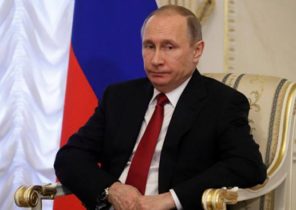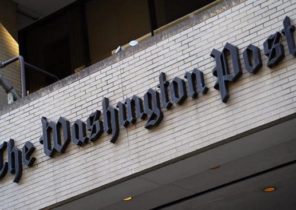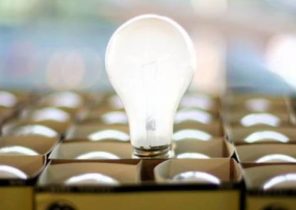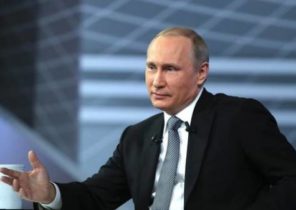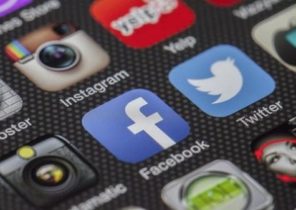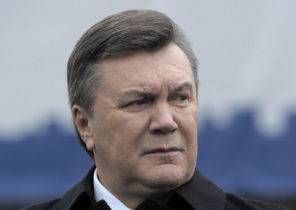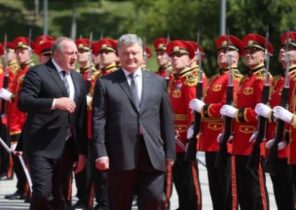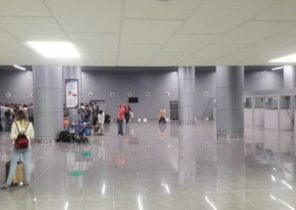The statements of President Vladimir Zelensky in the course of events in honor of world war II, may 8 and 9 will be considered very carefully. They are waiting with great interest, since everything about the history of this period, actively discussed in Ukraine. Word came to power less than a year ago, the President will be considered as an indication of what meaning he wants to give his power, and what kind of relationship it seeks to build with the European Union and Russia.
The historic conflict with Russia
Russia turned the may 9 Victory day (armistice was signed in Berlin on 8 may at 23 hours, when in Moscow was already hour of the night) in the event of the first importance. This day is dedicated to the glorification of heroism of the Russian army (it is considered to be the sole heir of the red army) and the victims of the USSR in the struggle with the Reich. In this day held a March “Immortal regiment”, under which millions of Russians are photos of ancestors fought. The event unites the Russians against the alleged “enemies,” as he writes in the eponymous book by Galina Ackerman. March takes place in Ukraine, where it collects for the most part those who are nostalgic for the Soviet era. Anyway, this spirit is not Central in the Ukraine, and after Euromaidan in 2014, the country for the most part decided to break with the Communist past.
In April 2015, the Parliament adopted a number of laws on “decommunisation” of the country. It was in particular the banning of the Communist party, renamed is named in honor of former Soviet leaders of towns and streets, prohibition of propaganda of totalitarian ideology. There were four of them: “On commemorating the victory over Nazism in the Second world war 1939-1945”, “the access to the archives of repressive bodies of the Communist totalitarian regime 1917-1991”, “condemning the Communist and national socialist (Nazi) totalitarian regimes in Ukraine and the prohibition of propaganda of their symbols” and “On the legal status and the memory of fighters for independence of Ukraine in XX century”. The first of these, made on may 8 “a Day of remembrance and reconciliation”, may 9 — “victory Day over Nazism in the Second world war.”
Within this new narrative tribute to all who fought on the fields of world war II resonates with the worship of those who are now fighting in the Donbass with Russian-backed separatists.
What is even more important in the framework of the law of Ukraine no longer uses the Soviet term “Great Patriotic war”, and speaks of the “Second world war”. This is not just a detail. Putting the outbreak of war in 1939, Ukraine includes in it the period when the USSR was an ally of Nazi Germany in the Molotov-Ribbentrop Pact. The great Patriotic war in Russia began only in June 1941… Thus, Ukraine began to form their own reading of history.
During the conference in the Bundestag on 20 June 2017 American historian Timothy Snyder stressed the need to form a clear historical picture of past events in Ukraine. First of all, he recalled that Ukraine was given a Central role in the project of the German conquest, and it was to be a German colony. Added to this is the fact that all of Ukraine was occupied during the greater part of the war and was the theatre of many atrocities, such as executions at Babi Yar.
Timothy Snyder believes that knowledge of past events in Ukraine due to Russian denial of the very existence of this nation have shaped black-and-white view, in which the victory over Nazism is a Russian, and collaboration — Ukrainian: “Why no one remembers the fact that Ukraine was the center of German war plans? The Ukrainians were slaves in Germany? What if we want to understand the Holocaust, we need to start with the Ukraine? There are many reasons. One of them is left by the colonization of the psychological footprint. A tendency not to take into account the people who were not considered people.”
Count of Ukrainian victims
This view of the history of Ukraine opposes another, disputing Russia’s claim to all Soviet heritage. The Ukrainian Institute of national memory, whose work is controversial, says that in the ranks of the red army during world war II he served 6 million Ukrainians (which is more than the troops of the French, the British and Americans combined). He also claims that the one who raised the Soviet flag over the Reichstag was the Ukrainian, and the concentration camp Auschwitz was liberated by the 60th army of the First Ukrainian front…
In Ukraine consider that in the Ukrainian SSR during the Second world war killed 5 million civilians, including 900 000 Jews while in the fighting killed 1.5 million of the Ukrainian soldiers. That is, only Ukrainians were 6.5 million of the 27 million Soviet victims of the Second world war (the figure today is Russia).
This in Kiev also adds 2.3 million deportation of Ukrainians to forced labor in Germany and the destruction of 700 towns and 30,000 villages. About numbers, of course, is debatable, but it is more important than the fact that Ukraine is trying to claim its share of victims, which previously were drowned in Soviet statistics.
The separatists revere Stalin, Ukraine is probing the past
In the Ukraine historical picture also takes a place of the Ukrainian insurgent army, which was trying to free the country by fighting on two fronts, against Nazi and Soviet troops. The glorification of soldiers of the UPA (organization banned in Russia — approx.ed.) now opposed to developed in Soviet times, the version with the criminalization of this movement, which is now actively used in the Russian historiography. Anyway, I own Ukrainian historians there is no consensus about these events, in particular the atrocities of the UPA against the poles and the participation of Ukrainians in the liquidation of Jews. Ukraine takes time for a critical examination of his past.
The leaders of the separatist DPR and LPR in turn followed in the footsteps of Russia and made may 9 key holiday. They even went further in showing devotion to the glorious Soviet past: may 9, 2020 Donetsk on the day renamed in Stalino. The city has had this name from 1924 to 1941 and from 1943 to 1961…
He looks at the history Zelensky?
The former President was in power from 2014 to 2019 in the conditions of war with Russian-backed separatists and supported efforts to form a new national history. He rebuilt the army with the aim of distancing from the Soviet model, changed the uniform, titles and even the order of treatment was replaced by “comrade” to “mister”. When the Parliament officially recognized the deportation of Crimean Tatars as genocide. Recall that Stalin took the decision on the collective deportation of the Crimean Tatars in may 1944, just a month after the liberation of the Peninsula, for collaborating with the Nazis. The Tatars were allowed to return to Crimea only in 1986.
Intentions of the new President Vladimir Zelensky not transparent. He is still changeable and atypical political figure whose views are harder to identify. It demonstrates continuity with its predecessor in all that relates to Ukraine’s rapprochement with the European Union but takes a more cautious stance on sensitive issues.
The epidemic of coronavirus has allowed him to once again shy away from the topic. The cancellation of the may 9 parade in Moscow have saved him from having to answer a difficult question: to go or not? In any case, the Ukrainian Ambassador to Germany refused to participate in a joint ceremony with his Russian counterpart, which wanted to hold Berlin.
In Ukraine, the ceremony is minimized due to isolation. Ukrainians are encouraged to attach to the Facebook profile of the poppy flower: with its help the British pay tribute to those who died in the First world. Ukraine thereby distanciruemsa from that adopted in Russia the ribbons. Scheduled online conferences, and the publication of family histories by citizens and schools. Anyway, Vladimir Zelensky will be the first time to lead these ceremonies, and he will have to take the floor to decide what tone it will give 8 and 9 may.
